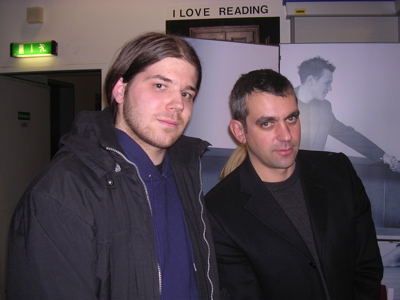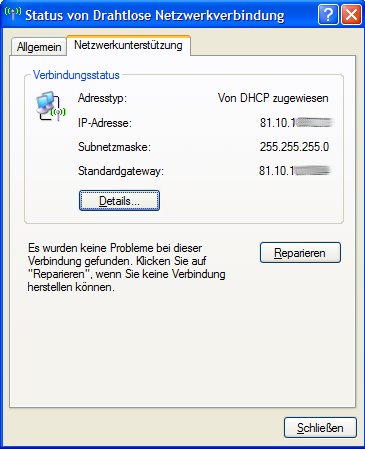Thursday, February 10. 2005
Request for hardware donation
Thursday, February 3. 2005
Signing/certifying applications and application security: I just don't get it
Friday, January 28. 2005
Wladimir Kaminer
Saturday, January 22. 2005
My dominant intelligence
Thursday, January 20. 2005
OpenOffice.org Base
Wednesday, January 19. 2005
The real meaning of "QED"
Tuesday, January 18. 2005
My nerd score
Monday, January 17. 2005
Forbidding the swastika
Wednesday, January 12. 2005
First Spanish lesson
Monday, January 10. 2005
Liwest WLAN insecurity
Saturday, January 8. 2005
Another two Wladmir Kaminer books finished
Friday, January 7. 2005
Subliminal messages
Tuesday, January 4. 2005
The Xen virtual machine monitor
About Me

Andreas Krennmair, software engineer, open-source developer, currently living and working in Berlin, Germany.
Calendar
|
|
July '17 | |||||
| Mon | Tue | Wed | Thu | Fri | Sat | Sun |
| 1 | 2 | |||||
| 3 | 4 | 5 | 6 | 7 | 8 | 9 |
| 10 | 11 | 12 | 13 | 14 | 15 | 16 |
| 17 | 18 | 19 | 20 | 21 | 22 | 23 |
| 24 | 25 | 26 | 27 | 28 | 29 | 30 |
| 31 | ||||||
Quicksearch
Show tagged entries
22c3 23c3 amsterdam announcement apache argentina army austria beer berlin book borland bsd c c++ camera censorship cms complaint concert conspiracy cooking electronic music email fail feedreader fefe film food fun gas mask gcc german germany git gnu golang google hacking history html http i18n imap internet israel job kaminer lecture linux linz mobile movie music mutt-ng network newsbeuter noos panorama pearl jam performance photo photography photos pictures polaroid police politics problem programming quiz rant recommendation release rss ruby screencast seagull security series server shell ska skabucks stfl terrorism travelling tv unix usa video vienna war web weird wikipedia windows work wplotd youtube
Blog Administration
Links
Blogroll
• xkcd.com
• Planet Debian
• MY POV ([expect the unexpected])
• C skills
• Planet Erlang / Published News
• armstrong on software
• Photos from akrennmair
• Das Metalab informiert
• dive into mark
• /usr/local/bin
• F!XMBR
• heise online News (full feed)
• JLog
• SecuriTeam Blogs
• .:Computer Defense:.
• Riot Porn
• Chaosradio
• Radiomultikulti vom RBB: Russendisko unplugged
• AK's weblog
• The Recurity Lablog
• milw0rm.com
• seclog.de
• ilja's blag
• udo.kernecker.at - mein leben als prinzregent... ;-)
• grabnerandi.at diary feed
• Hilli's WebLog
• accidents waiting to happen
• Venzi's Weblog
• TaoSecurity
• Irrlicht3d.org
• murphee's Rant
• waiterrant.net
• grml development blog
• mutt Changelog
• nion's blog
• Wannabe Everything
• blog@bytelabs
• Knowledge Brings Fear
• Die wunderbare Welt von Isotopp
• Fefes Blog
• law blog
• mikas blog
• BILDblog
• GoogleWatchBlog
• Krone - Blog
• The Lunatic Fringe
• mp's blog
• Su-Shee 2.0
• Sex, Drugs & Compiler Construction
• Qbi's Weblog
• gedankensplitter
• Ohns Gehirnschleimschmiede
• fh
• Clifford Wolf's Blog
• AK's moblog
• Telepolis News
• Slashdot
• Newssystem von bundesheer.at
• Riding Rails - home
• Serendipity
• O'Reilly Ruby
• CCC Events Weblog
• del.icio.us/dubrider
• del.icio.us/timpritlove
• del.icio.us/ak
• del.icio.us/mika
• AK's Soup
• Friends of ak
• Astronomy Picture of the Day
• german-bash.org - Die neuesten Zitate
• QDB
• WeirdWeirdWorld Latest Feed
• I CAN HAS CHEEZBURGER?
• The Trailer Mash
• Cruel.Com
• fun.drno.de
• Peter Pilz grüner Sicherheitssprecher Österreich Wien
• NPD-BLOG.INFO
• INSM Watchblog
• Hitler-Blog
• Everybody loves Eric Raymond
• Dilbert
• Planet Debian
• MY POV ([expect the unexpected])
• C skills
• Planet Erlang / Published News
• armstrong on software
• Photos from akrennmair
• Das Metalab informiert
• dive into mark
• /usr/local/bin
• F!XMBR
• heise online News (full feed)
• JLog
• SecuriTeam Blogs
• .:Computer Defense:.
• Riot Porn
• Chaosradio
• Radiomultikulti vom RBB: Russendisko unplugged
• AK's weblog
• The Recurity Lablog
• milw0rm.com
• seclog.de
• ilja's blag
• udo.kernecker.at - mein leben als prinzregent... ;-)
• grabnerandi.at diary feed
• Hilli's WebLog
• accidents waiting to happen
• Venzi's Weblog
• TaoSecurity
• Irrlicht3d.org
• murphee's Rant
• waiterrant.net
• grml development blog
• mutt Changelog
• nion's blog
• Wannabe Everything
• blog@bytelabs
• Knowledge Brings Fear
• Die wunderbare Welt von Isotopp
• Fefes Blog
• law blog
• mikas blog
• BILDblog
• GoogleWatchBlog
• Krone - Blog
• The Lunatic Fringe
• mp's blog
• Su-Shee 2.0
• Sex, Drugs & Compiler Construction
• Qbi's Weblog
• gedankensplitter
• Ohns Gehirnschleimschmiede
• fh
• Clifford Wolf's Blog
• AK's moblog
• Telepolis News
• Slashdot
• Newssystem von bundesheer.at
• Riding Rails - home
• Serendipity
• O'Reilly Ruby
• CCC Events Weblog
• del.icio.us/dubrider
• del.icio.us/timpritlove
• del.icio.us/ak
• del.icio.us/mika
• AK's Soup
• Friends of ak
• Astronomy Picture of the Day
• german-bash.org - Die neuesten Zitate
• QDB
• WeirdWeirdWorld Latest Feed
• I CAN HAS CHEEZBURGER?
• The Trailer Mash
• Cruel.Com
• fun.drno.de
• Peter Pilz grüner Sicherheitssprecher Österreich Wien
• NPD-BLOG.INFO
• INSM Watchblog
• Hitler-Blog
• Everybody loves Eric Raymond
• Dilbert










